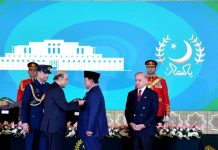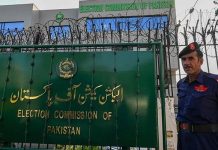NEW YORK: A senior Pakistani diplomat has called for restructuring the UN Security Council’s (UNSC) ‘penholder system” that gives a Council member control over the agenda and drafting of a resolution, as he said the 15-member body was being used by some for geostrategic reasons, putting into question its role to act “on behalf of all UN member states.”
“Penholder system in essence enables the holder of the pen to take leadership over a situation on the agenda of the Council and to control the structure and core content of a resolution that does not represent the view of UN’s wider membership,” Ambassador Aamir, acting permanent representative to the UN, said, while citing the August 2021 incident when India, as the Security Council President, denied Pakistan an opportunity to address the Council as a neighbouring country with a direct stake in peace in Afghanistan.
“Such was the case of Security Council’s meeting on Afghanistan last year when the President of the Council prevented Pakistan from participating in the Council meeting despite all other members of the Council agreeing to Pakistan’s participation at that meeting,” he told delegates in an Arria-Formula Arria-formula meeting, convened by Russia, on Thursday.
The format is named after a former Venezuelan ambassador to the UN, Diego Arriva. It is a very informal consultation process which affords members of the Security Council the opportunity to hear persons in a confidential, informal setting.
In his remarks, the Pakistani envoy said the Indian action “clearly demonstrates that the Council has become more ‘cloistered’, used by some for geostrategic reasons, which puts into question the Council’s role to act ‘on behalf of all UN member states’.”
“At present,” he said, “the penholders system represents interests of a few member states rather than of all”, saying it is devoid of expectations that the wider UN membership has from the collective security system of the UN Charter.
“This situation has given rise to unlawful practices that run contrary not only to the established principles of the UN Charter but also prevent the Council from working objectively,” Ambassador Aamir Khan said, pointing out that the most glaring impact was on Security Council decisions that are often drafted in small groups (mostly penholders) and presented as fait accompli.
“We must take cognizance of the fact that the current penholder system lacks the criteria for a fair and just working method,” he said, adding that too often the working methods of the Security Council were non transparent, discriminatory and unjustified.
“We believe that a systematic restructuring of the penholder arrangement is essential,” the Pakistani envoy said. Penholders and co-penholders should be both from the permanent and non-permanent members, who should engage closely with the countries concerned, fellow Council members, and the relevant departments of the Secretariat, so as to maximize consensus and avert confrontation, he said, pointing out it is a question of Council’s legitimacy, its credibility and effectiveness of its decisions.
Not only elected members but also non-members should be involved in Council meetings, he said.
“This also validates our long-held and principled view that the already exclusive and elitist culture of the Council – with outcomes mostly determined by its permanent members – can be changed, not by seating new permanent members on the Council but by enhancing its representatives, openness and inclusive decision-making through the expansion and empowerment of ‘elected’ non-permanent members,” the Pakistani envoy said.
The so-called Group of Four — India, Brazil, Germany and Japan — are campaigning for permanent seats on the Security Council, as part of the Council reform, while the Italy/Pakistan-led Uniting for Consensus (UfC) group firmly opposes any expansion in permanent category, and has proposed a new category of members — not permanent members — with longer duration in terms and a possibility to get re-elected.
“It is in the interest of everyone to seek a more democratic, effective and credible mechanism for the maintenance of international peace and security through a comprehensive reform of the Security Council,” Ambassador Aamir Khan said.
“We believe that Security Council should reflect interest of the wider UN membership.” –Agencies




